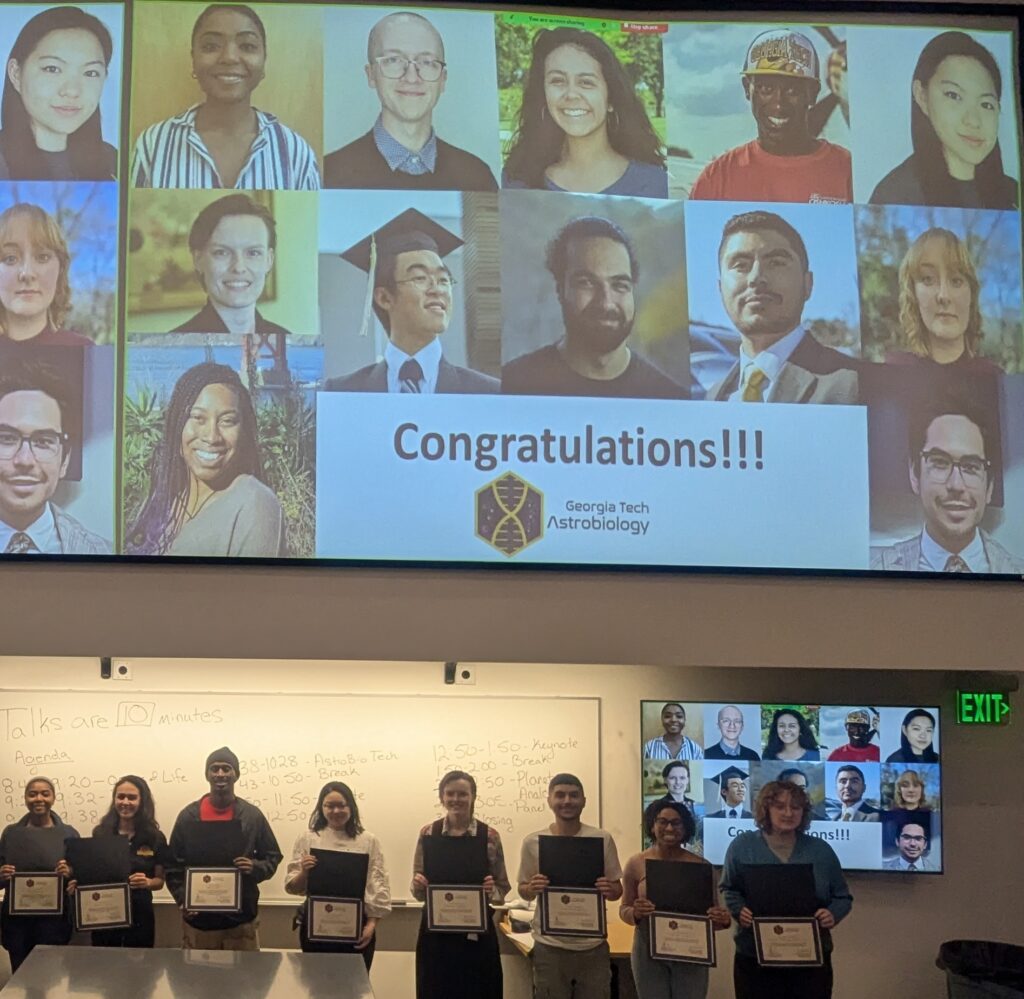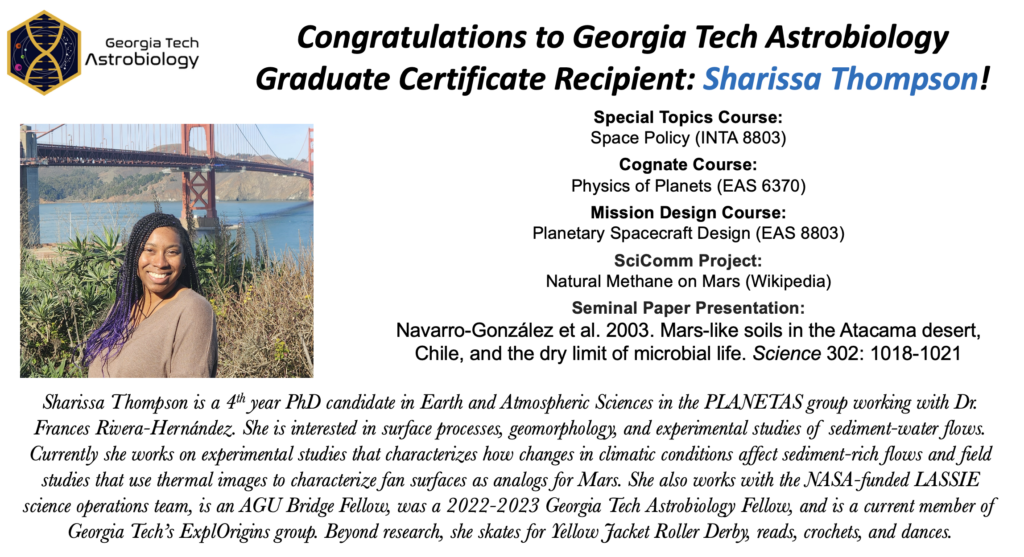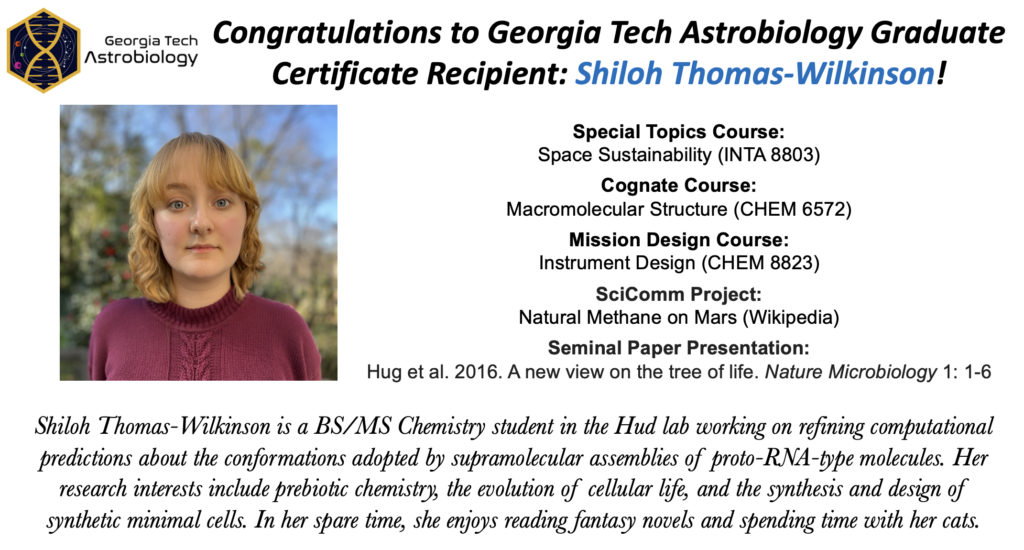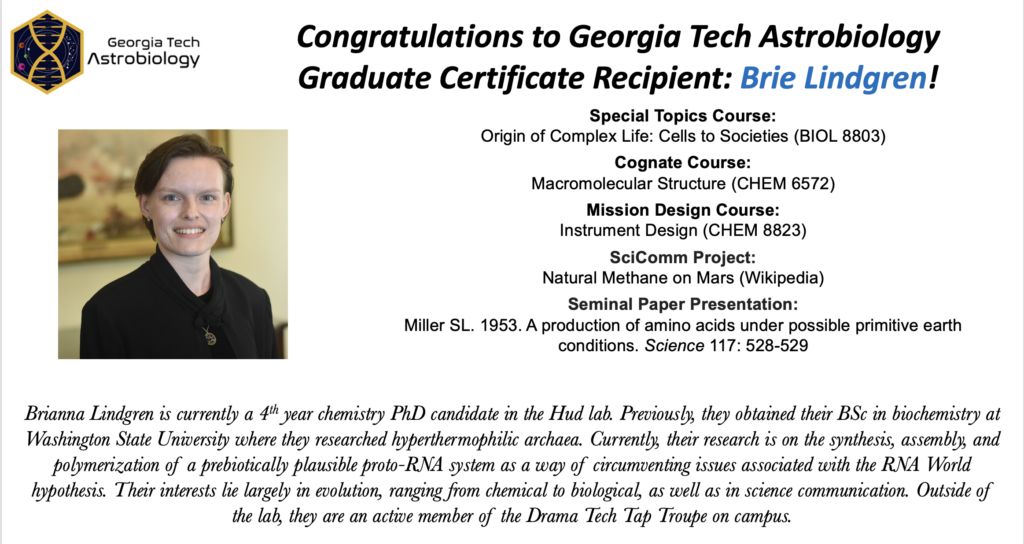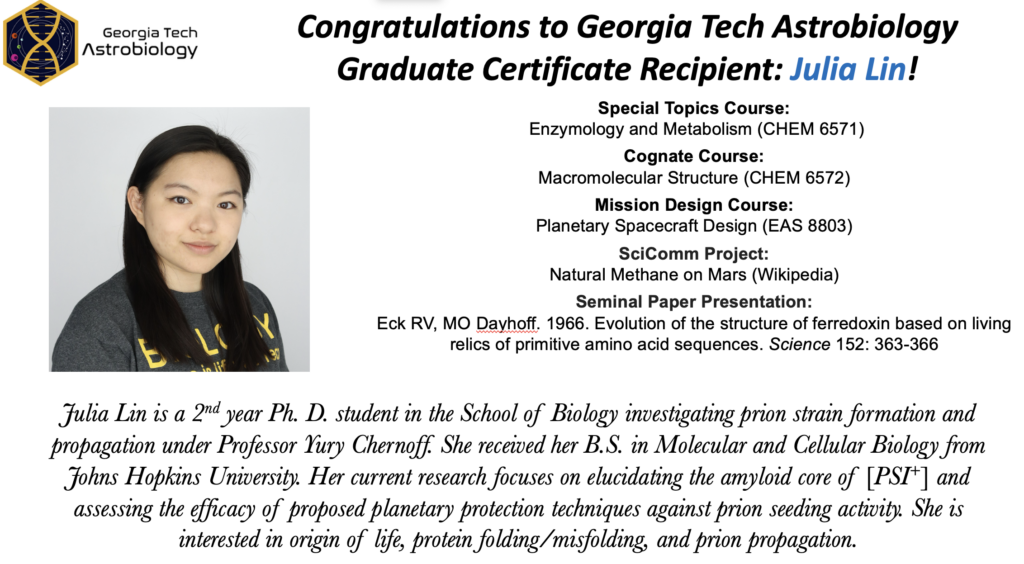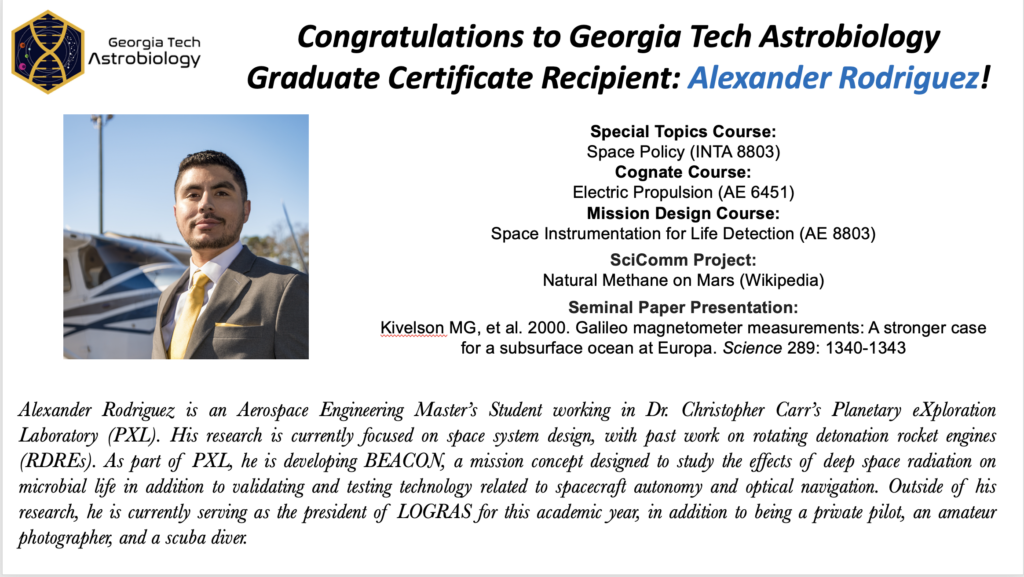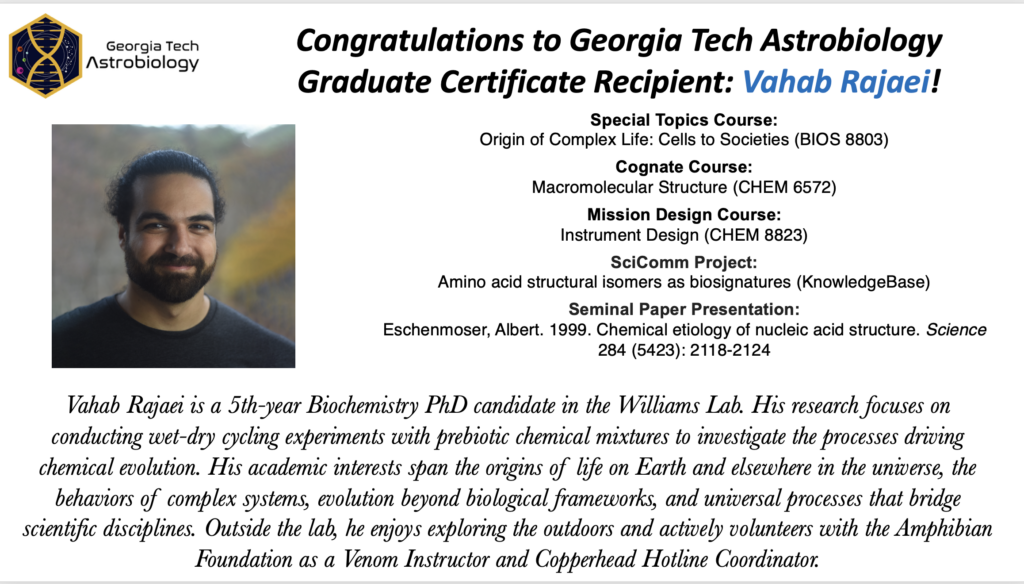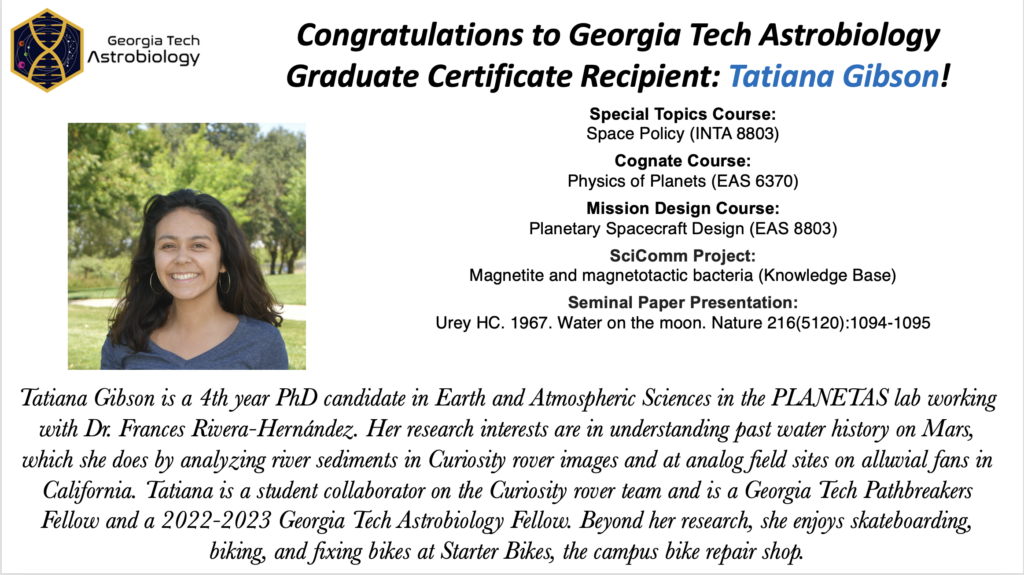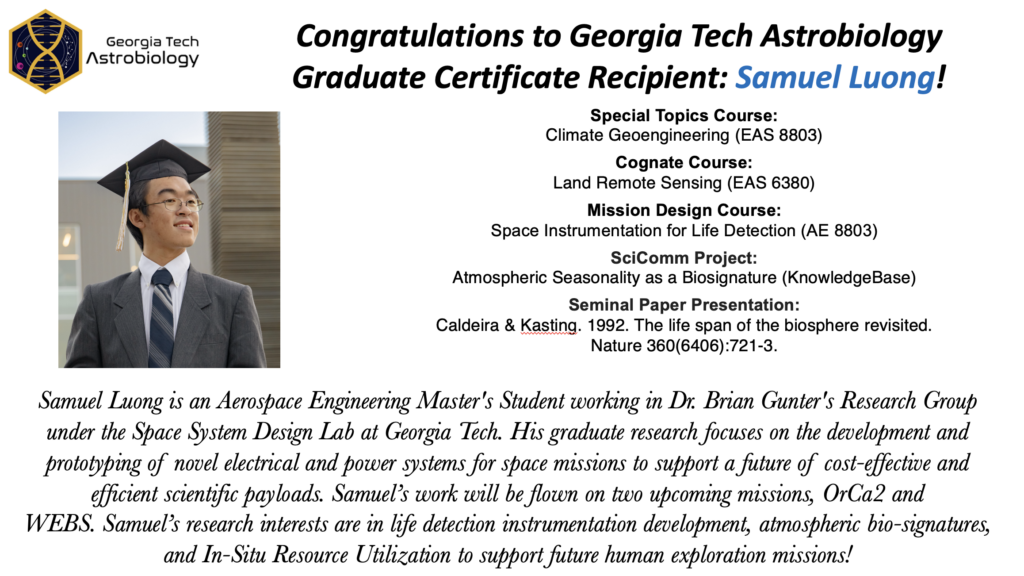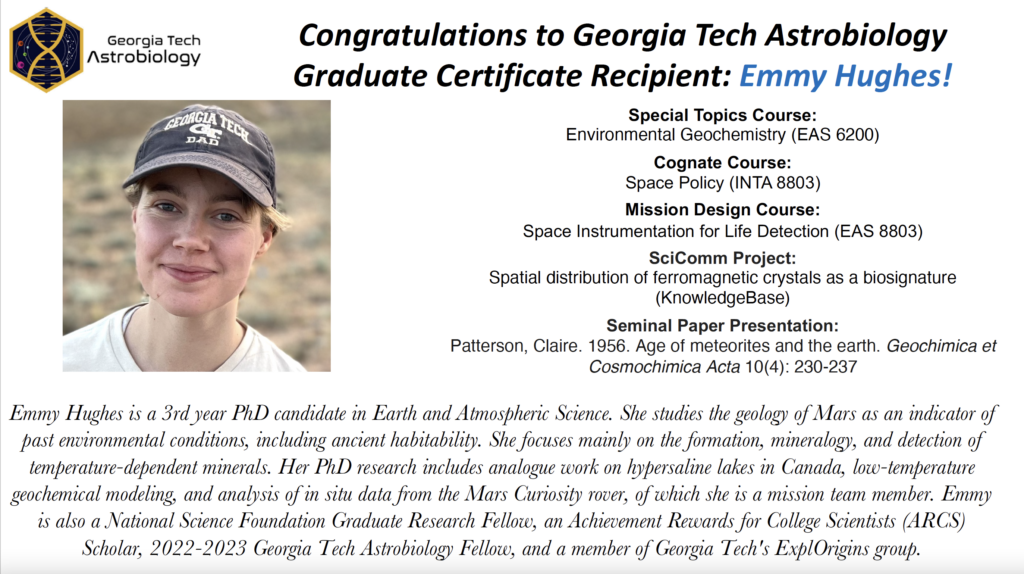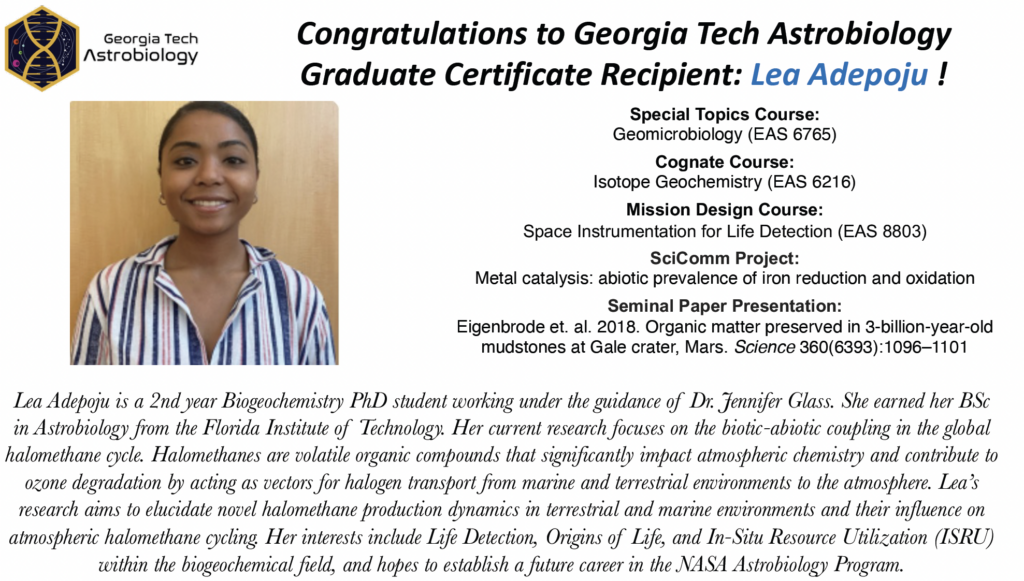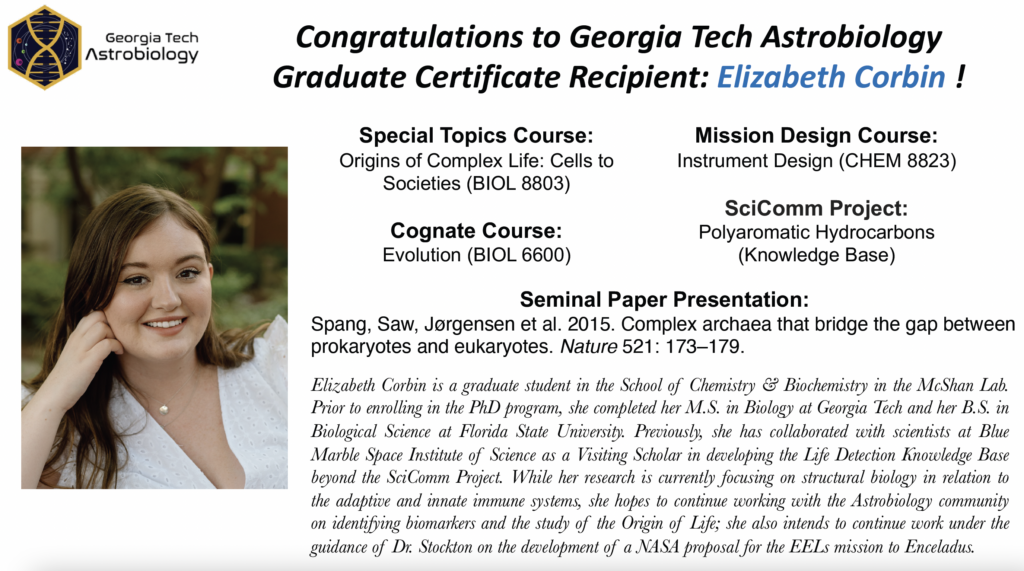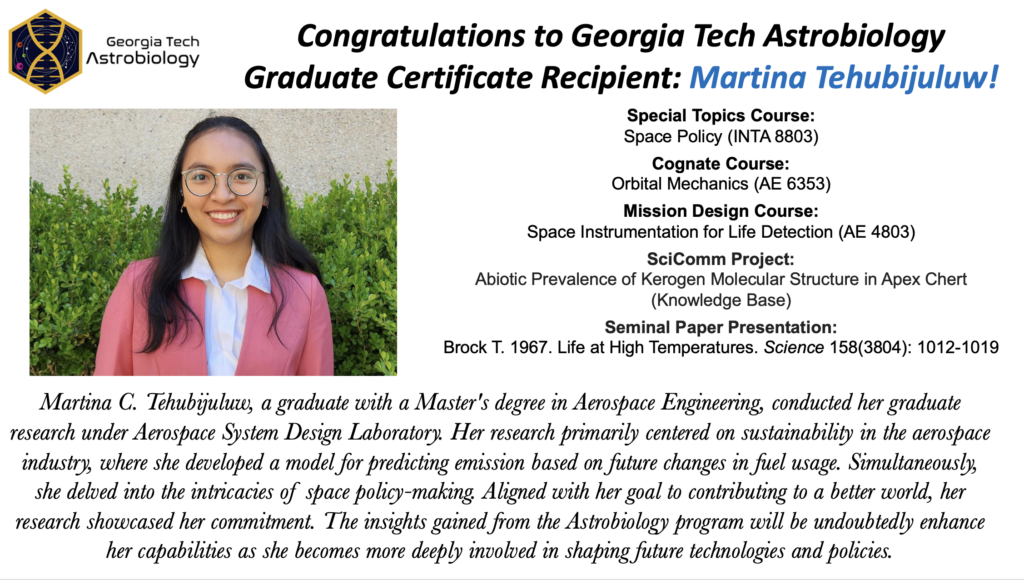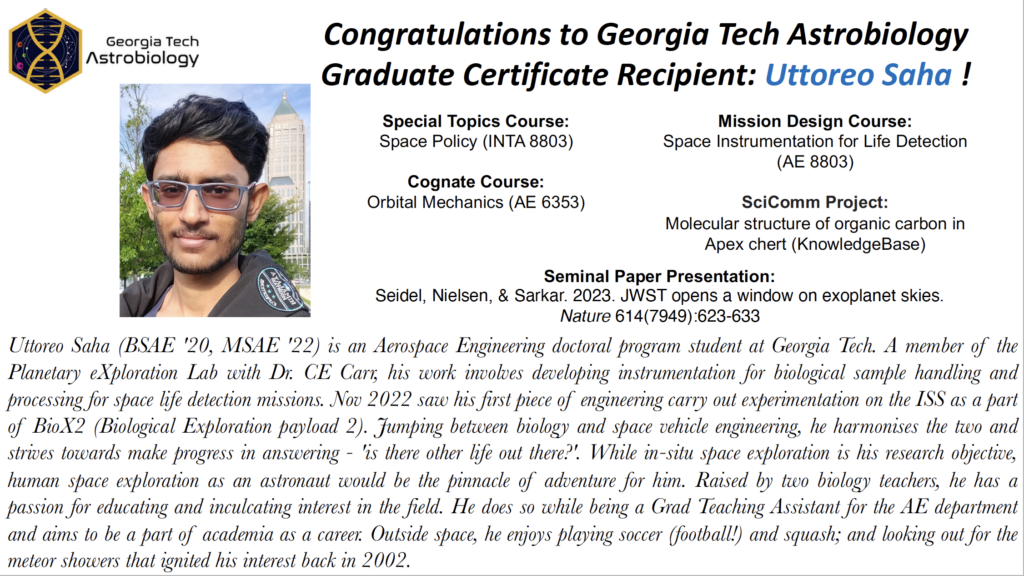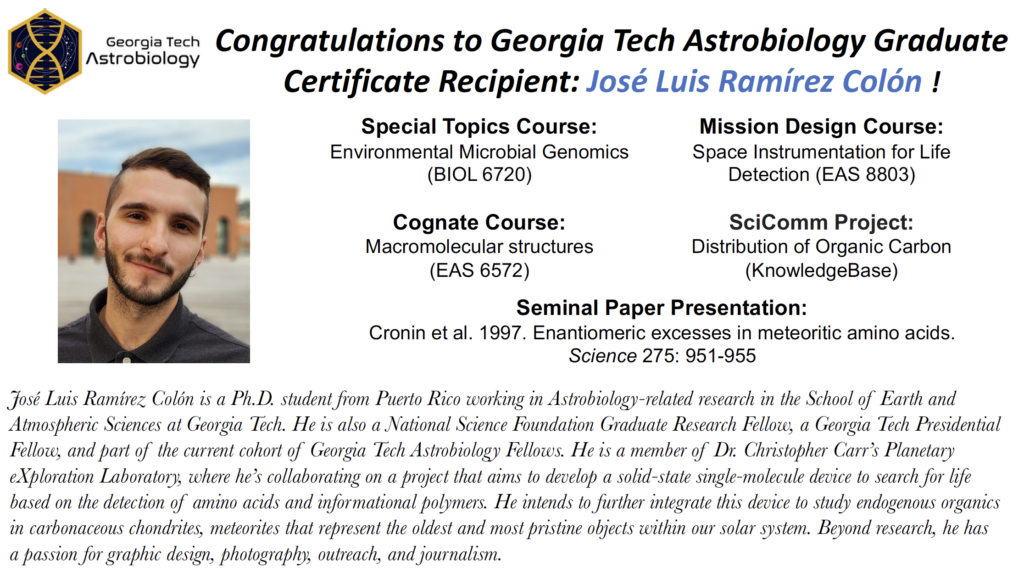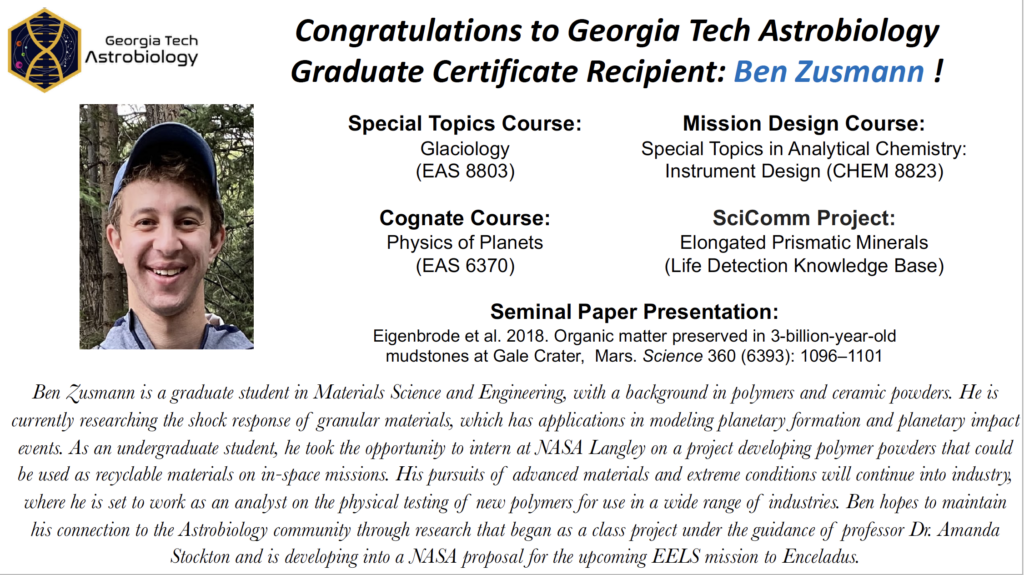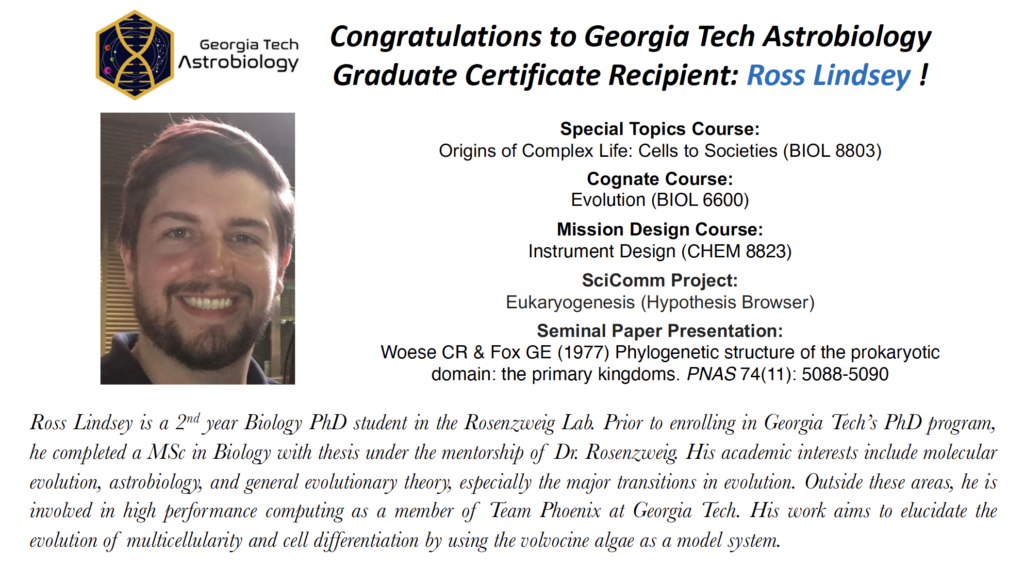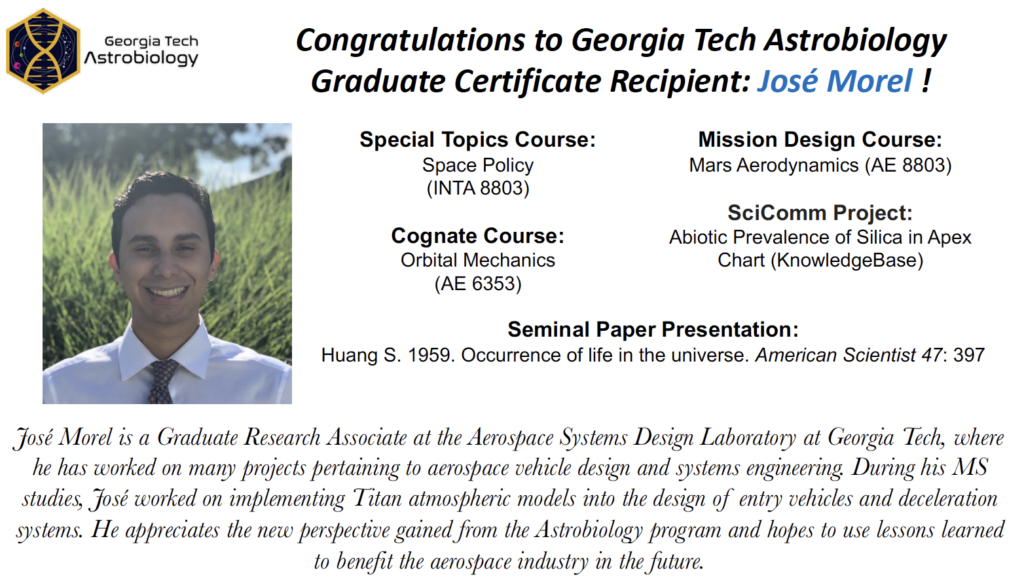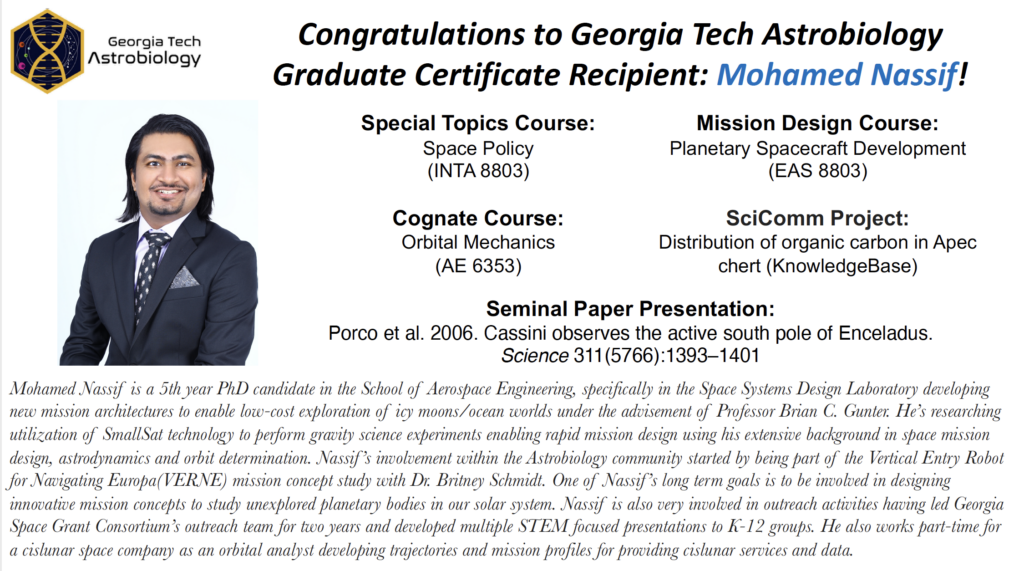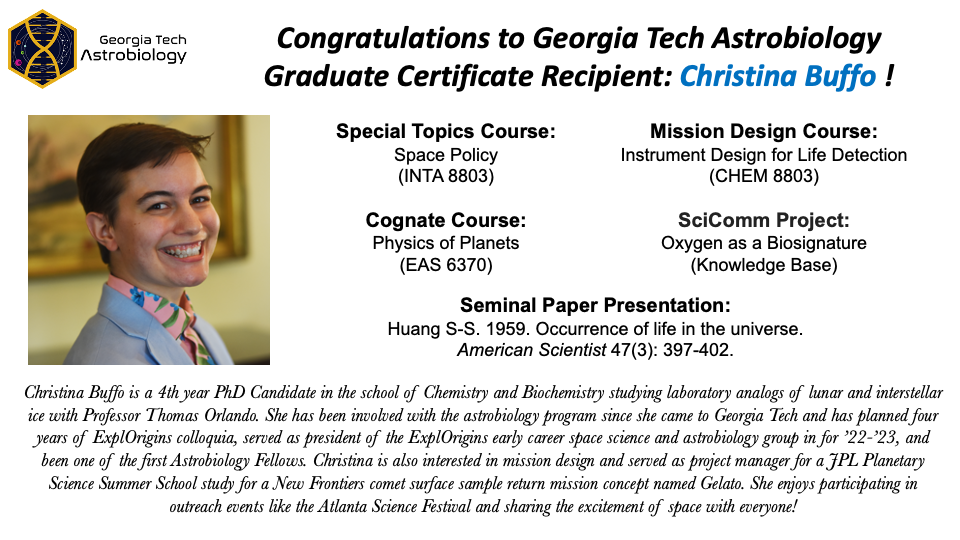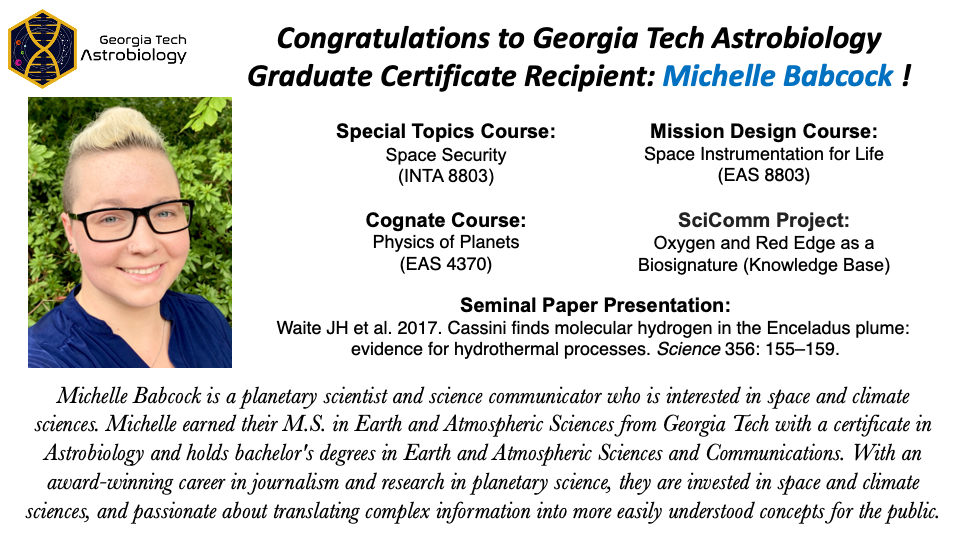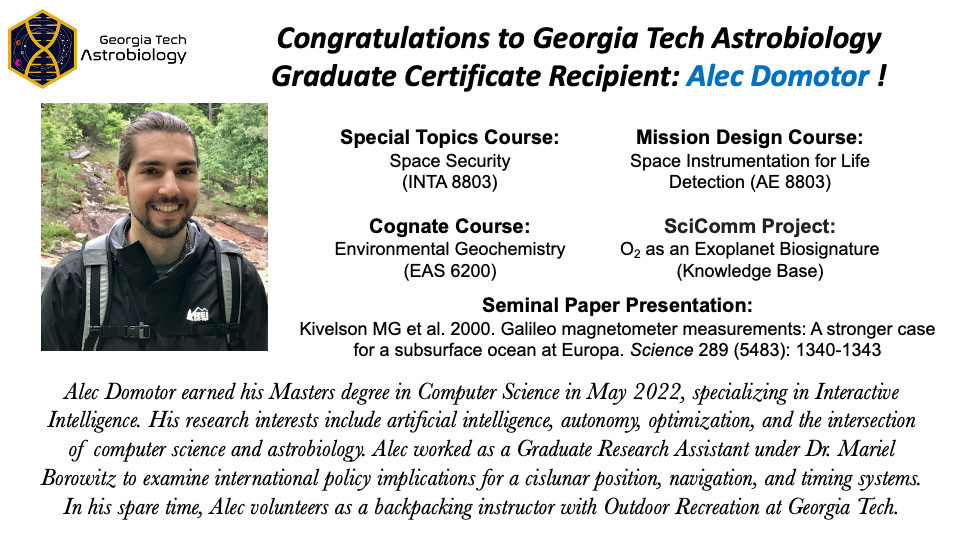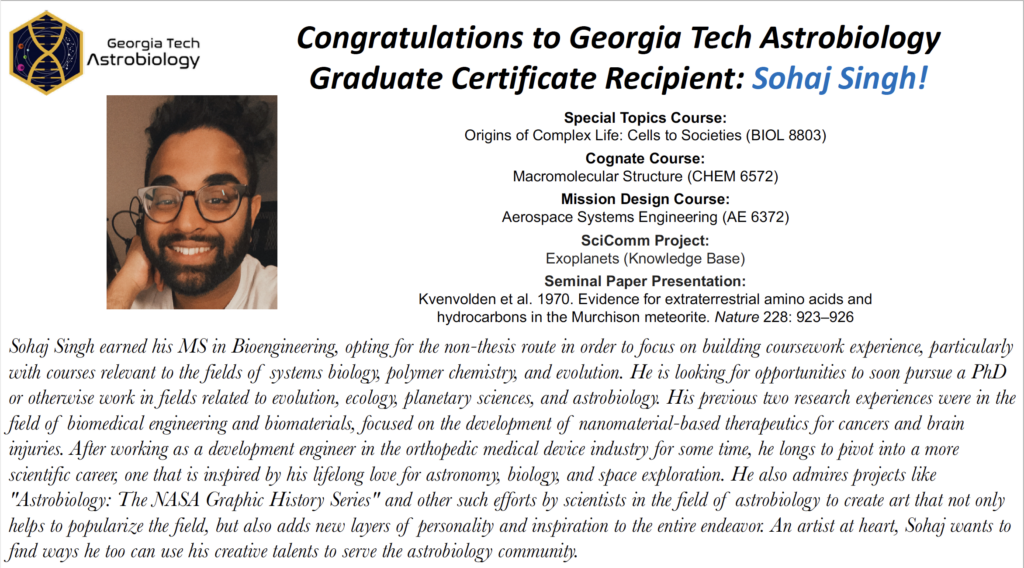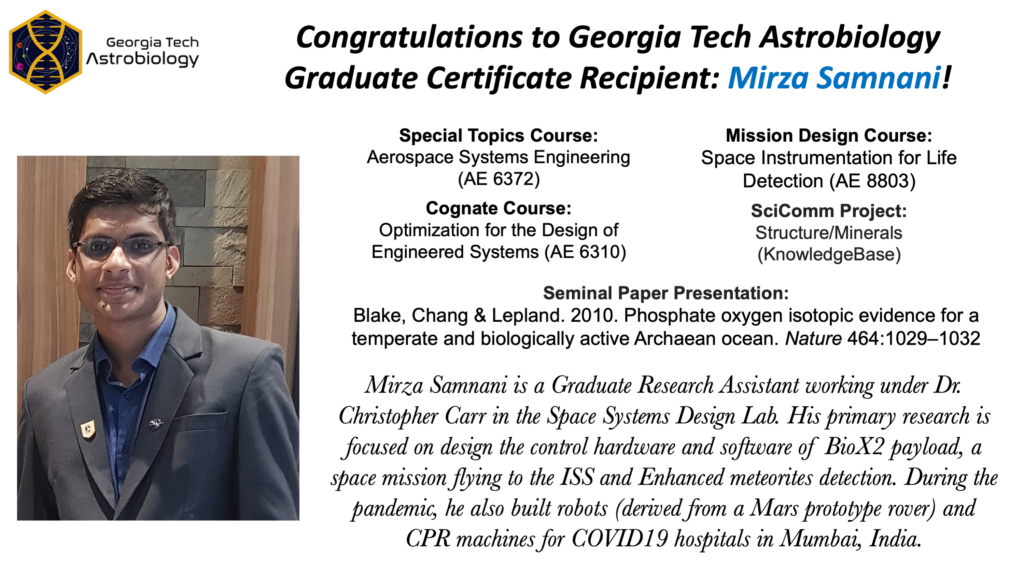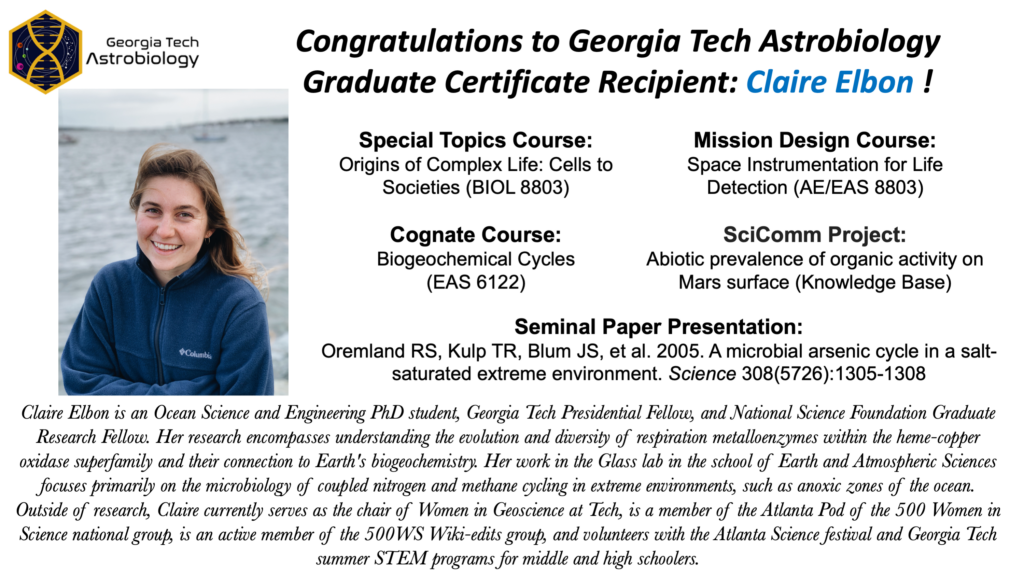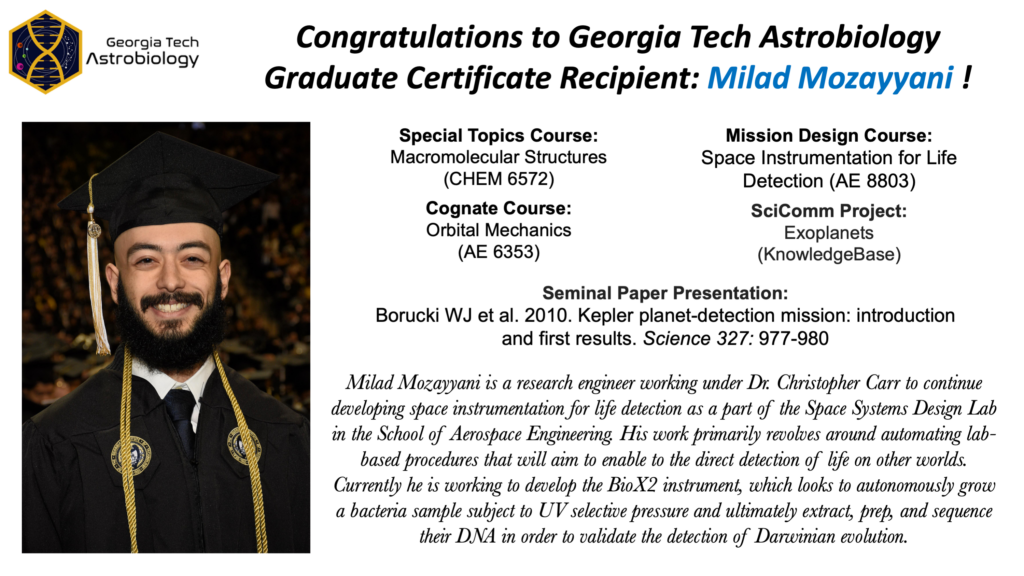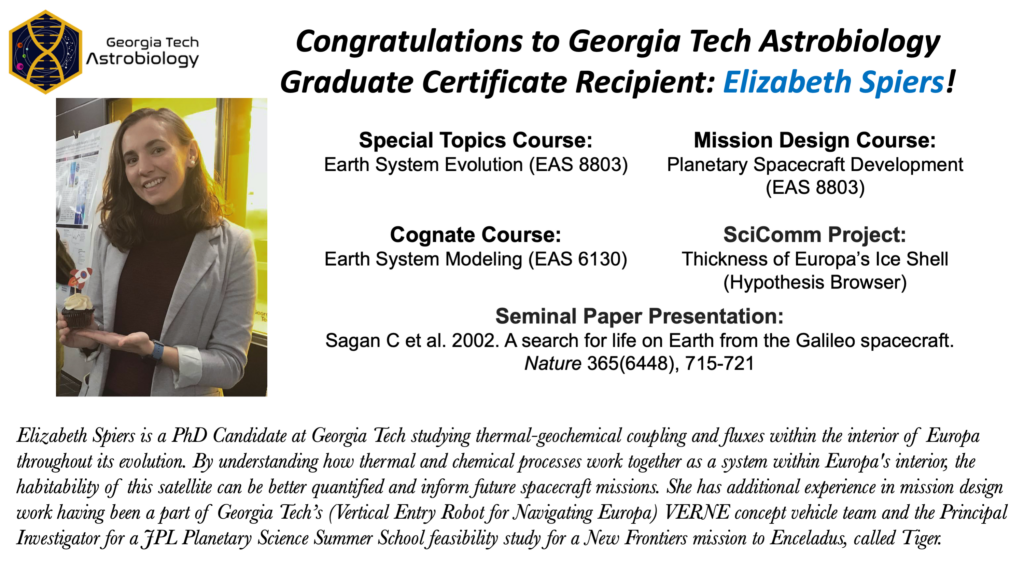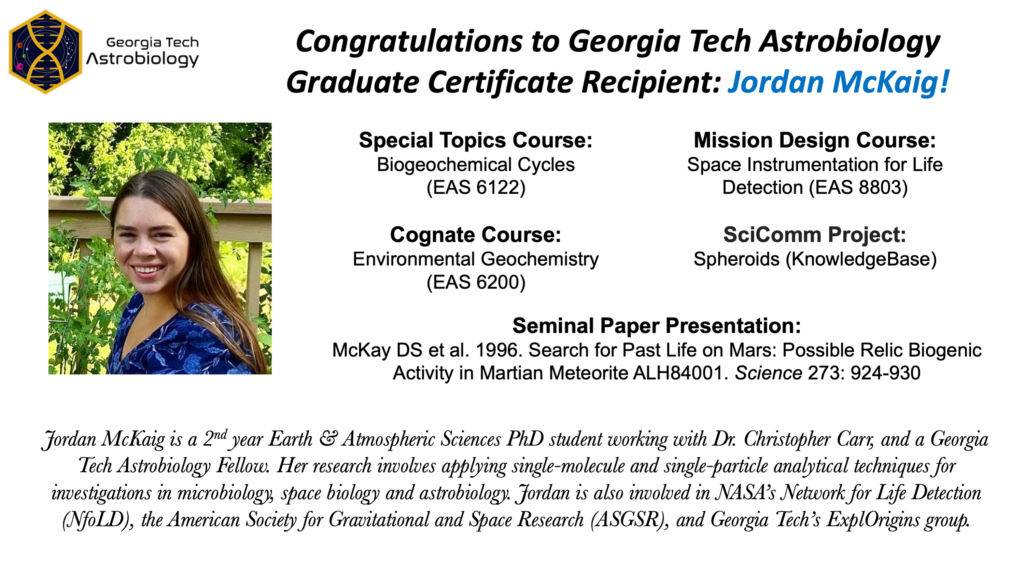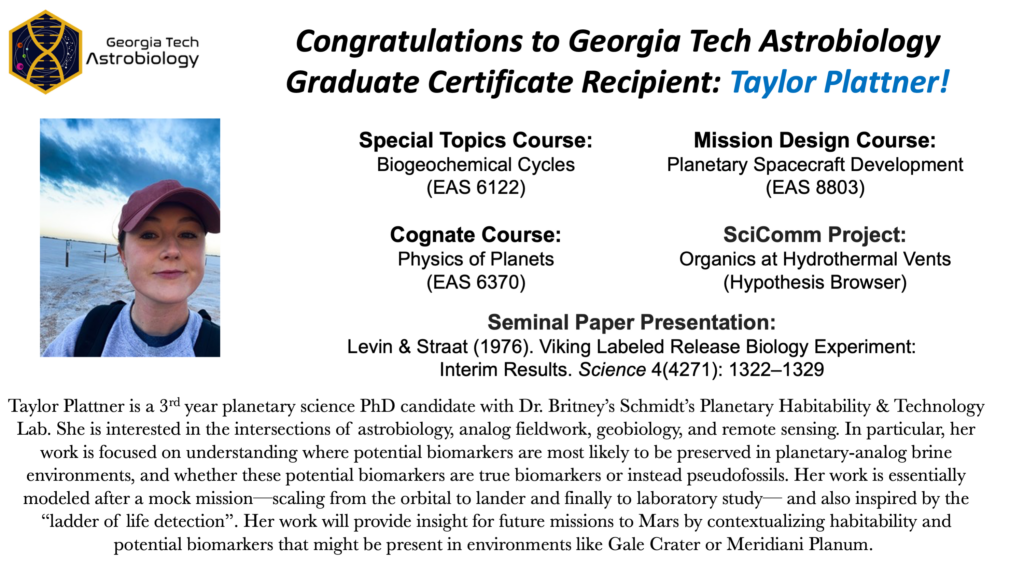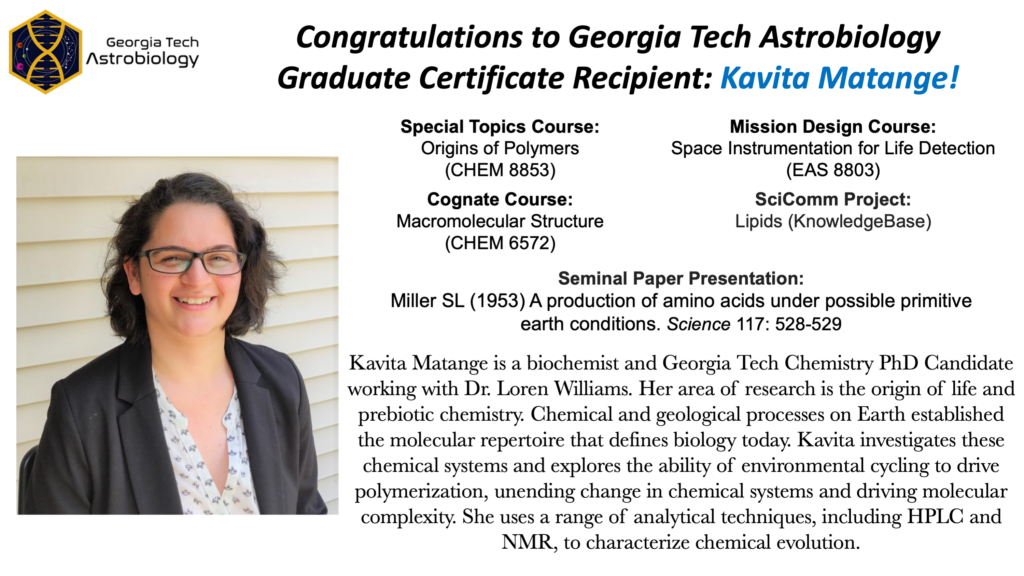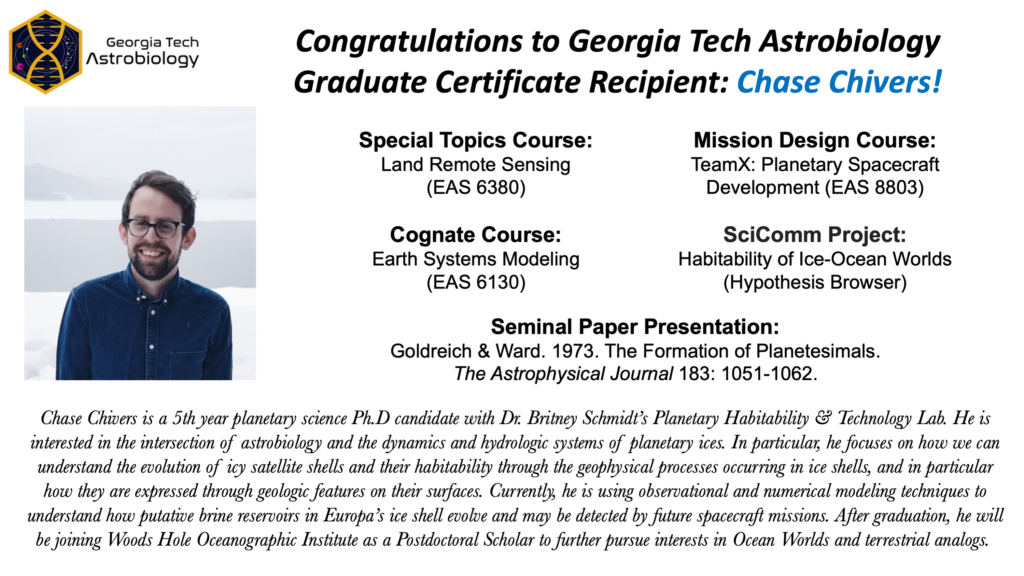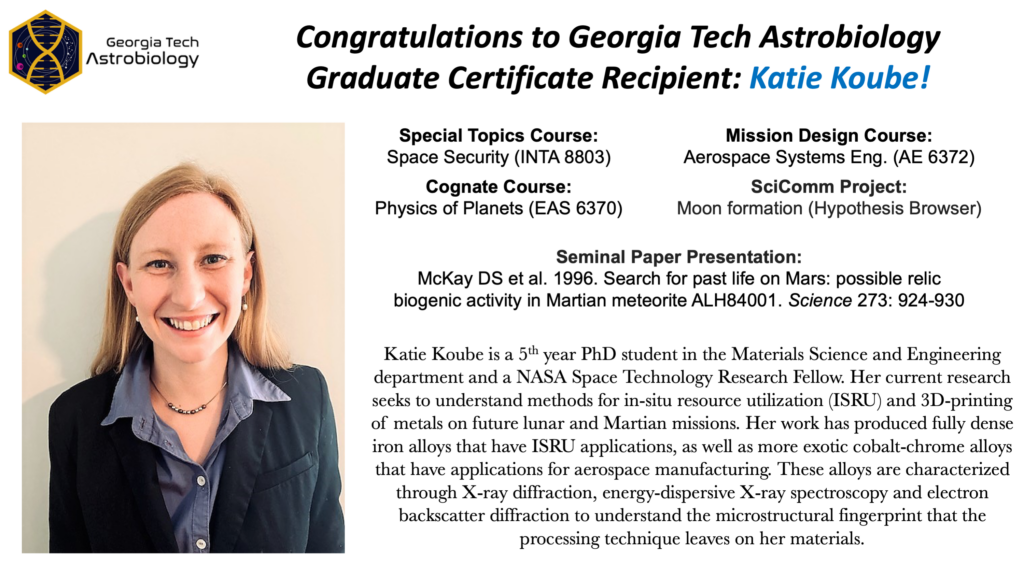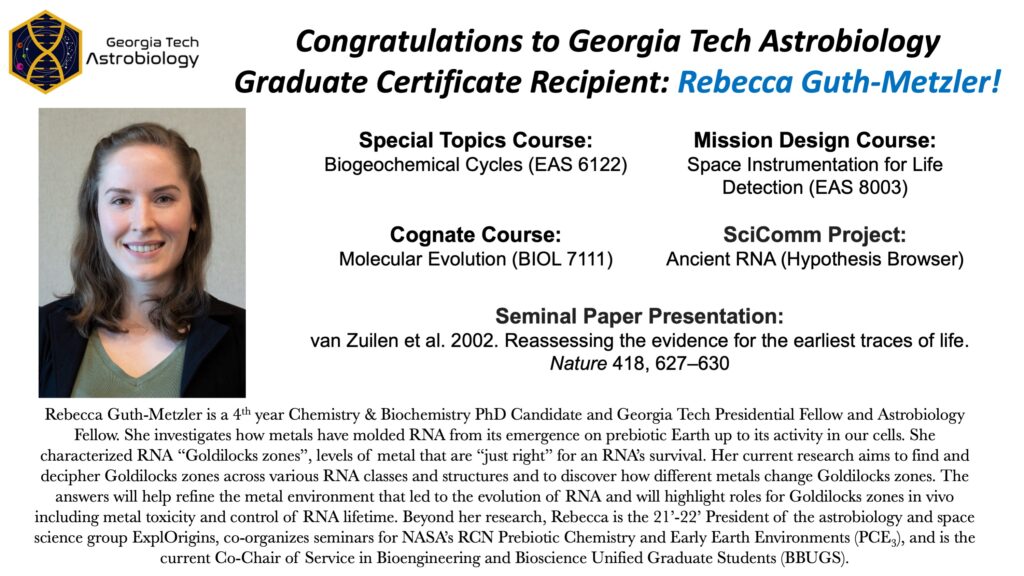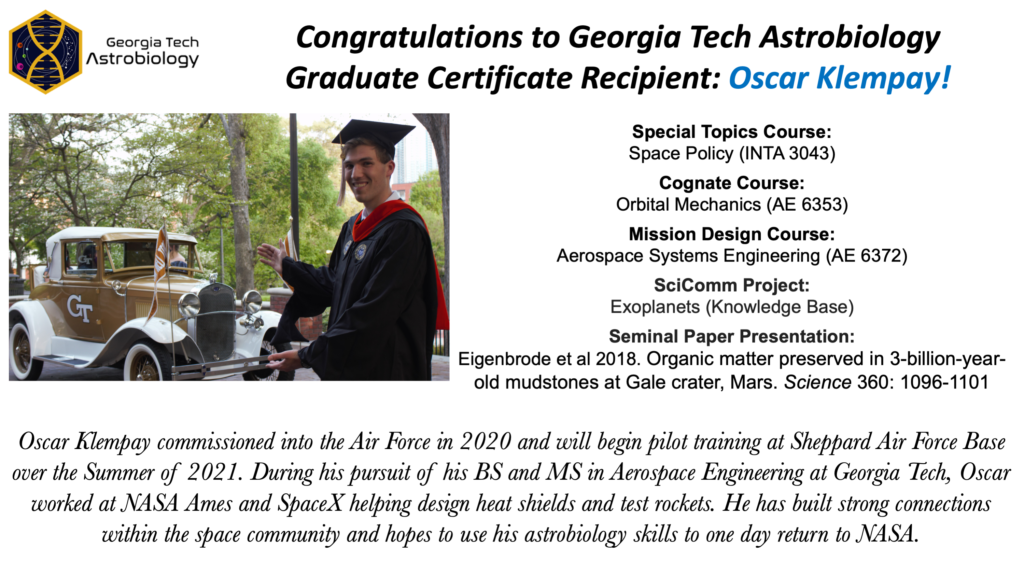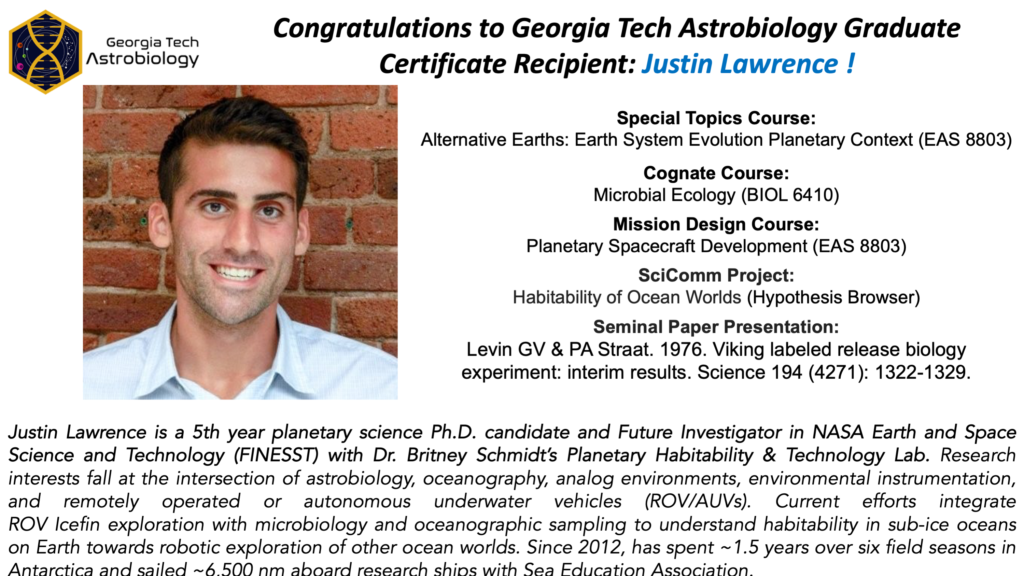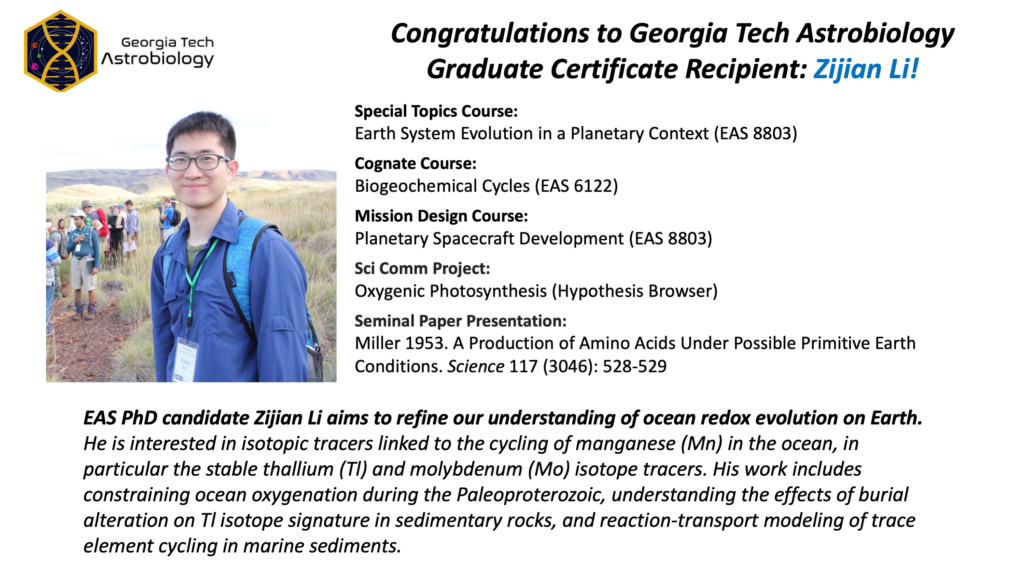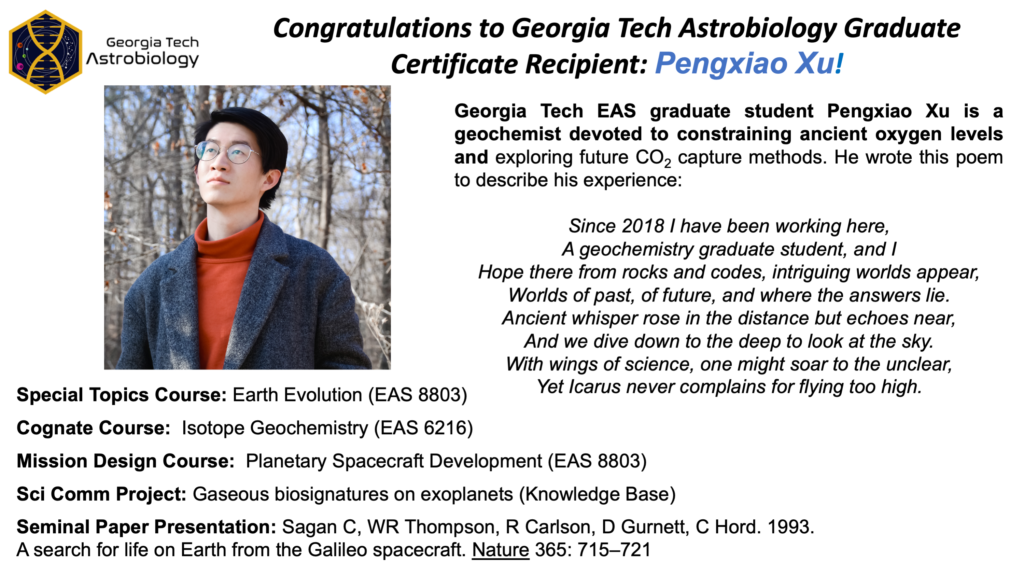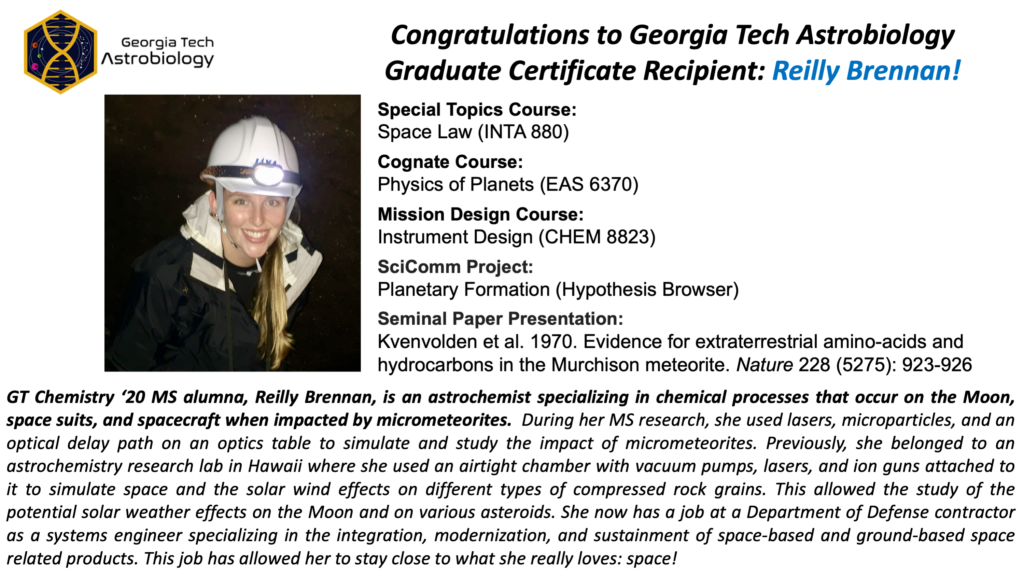Georgia Tech Astrobiology Graduate Certificate Program
The Georgia Tech Astrobiology Graduate Certificate Program is part of an initiative linking the Georgia Tech Schools of Earth and Atmospheric Sciences, Chemistry and Biochemistry, Biological Sciences, Physics, Daniel Guggenheim School of Aerospace Engineering, and Sam Nunn School of International Affairs.
The purpose of the certificate program is to expand opportunities for students in the interdisciplinary field of astrobiology, which combines astronomy, biology, geosciences, chemistry, and physics to understand the origin, evolution, and possible distribution of life in the universe.
Unique components of the GT certificate program include the mission design course, in which students will forge innovative links between astrobiology science and engineering, and the science communication project, in which students will gain skills in translating astrobiology findings to the greater community.
The 12-credit embedded certificate program is open to graduate students (PhD, MS, or BS/MS) enrolled in any degree program at Georgia Tech. There are no prerequisites for entering the program. More on graduate certificate programs at Georgia Tech here.
REQUIREMENTS
- Students must complete the two required core courses, one cognate course, one special topics course, and one mission design course (see list below).
- All coursework must be completed with a grade of B or higher.
- If you have met the requirements to complete the Astrobiology Graduate Certificate, complete this form and email it to Prof. Jennifer Glass jennifer.glass@eas.gatech.edu. Please do not submit the form until you have completed all of the requirements for the certificate. Certificates will be awarded at the next ExplOrigins Astrobiology Symposium (annually during spring semester).
CURRICULUM
Required Core Courses (3 credit hours total)
EAS 4801/8001: Planetary Science & Astrobiology Seminar (1 credit, pass/fail, offered every semester): Students will attend and participate in weekly seminars on Friday mornings. [spring 2022 syllabus]
EAS/CHEM/BIO 4802/8802: Seminal Papers in Astrobiology (2 credits, letter grade, offered spring semesters): This course will meet for two hours each week to discuss highly cited papers spanning astrobiology sub-disciplines. Students will also complete an independent science communication project. [spring 2022 syllabus] [spring 2022 sci comm project]
One Cognate Course (3 credit hours; 1 course from list below*):
AE 6353: Orbital Mechanics
AE 6355: Planetary Entry, Descent, and Landing
AE 6450: Rocket Propulsion
AE 6451: Electric Propulsion
BIOL/EAS 6765: Geomicrobiology
BIOL 4410/6410: Microbial Ecology
BIOL 4428/6428: Population Dynamics
BIOL 3600/6600: Evolution
BIOL 4607/6607: Molecular Microbiology of Microbes
BIOL 6720: Environmental Microbial Genomics
CHEM 4803/6572: Macromolecular Structure
CHEM 6582: Biophysical Chemistry
EAS 4602/6122: Biogeochemical Cycles (no pre-reqs)
EAS 4610/6130: Earth System Modeling
EAS 4220/6200: Environmental Geochemistry
EAS 6216: Isotope Geochemistry
EAS 4224/6224: Mineral Surface Geochemistry
EAS 4370/6370: Physics of Planets
EAS 4375/6375: Earth and Planetary Materials
EAS 6380: Land Remote Sensing
One Special Topics Course (3 credit hours; 1 course from list below*):
BIOL 4225/7111: Molecular Evolution
BIOL 8744: Microbial Symbiosis and Microbiomes
BIOL 4803/8803: Origin of Complex Life: Cells to Societies
CHEM 8803: Chemistry of the Origins & Early Evolution of Life
CHEM 8833: Introduction to Organic Mechanisms
CHEM 4803/8853: Structure, Function & Origins of Biological Macromolecules
CS 7492: Simulation of Biological Systems
EAS 4803/8803: Ice-Ocean Moons and Planets
EAS 4803/8803: Origin of Planetary Systems
EAS 4803/8803: Earth System Evolution in a Planetary Context (no pre-reqs)
INTA 8001: Science, Technology & International Affairs
INTA 3043/8803: Space Policy (no pre-reqs)
INTA 8803: Space Security
PHYS 8813: Radiative Processes
One Mission Design Course (3 credit hours; 1 course from list below*):
AE 6372: Aerospace Systems Engineering
AE 6561: Reliable Control Software for Aerospace
AE 8803: Satellite Orbit Determination
AE 8803: Small Satellite Design I/II
AE 8883: Spacecraft Engineering
AE/EAS 4803/8803: Space Instrumentation for Life Detection
AE/EAS 4803/8803: Planetary Spacecraft Design
CHEM/AE/EAS 4770/6770: Instrument Design for Astrobiology Missions
*Students may petition to substitute cognate, special topics, and mission design course(s) with alternative courses that cover material of relevance to astrobiology. Each course can only count towards one category.
Ten-minute overview of the Georgia Tech Seminal Papers in Astrobiology science communication project at AbSciCon22.
EXAMPLE SCHEDULES
AE graduate student
Spring 1: Core course (EAS 8001+8802)
Fall 1: Cognate course
Spring 2: Mission course
Fall 2: Special Topics course
BIOL or CHEM graduate student
Spring 1: Core course (EAS 8001+8802)
Fall 1: Cognate course
Spring 2: Mission course (e.g. CHEM 8823)
Fall 2: Special Topics course
EAS graduate student
Spring 1: Core course (EAS 8001+8802)
Fall 1: Cognate course
Spring 2: Mission course (e.g. EAS 6360 or 8803)
Fall 2: Special Topics course
COURSES IN ACTION
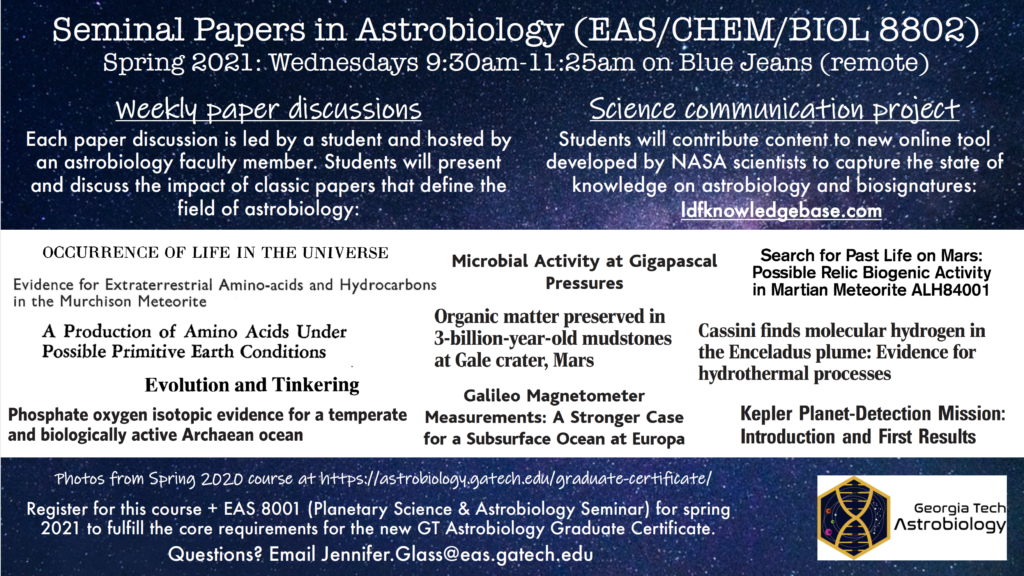
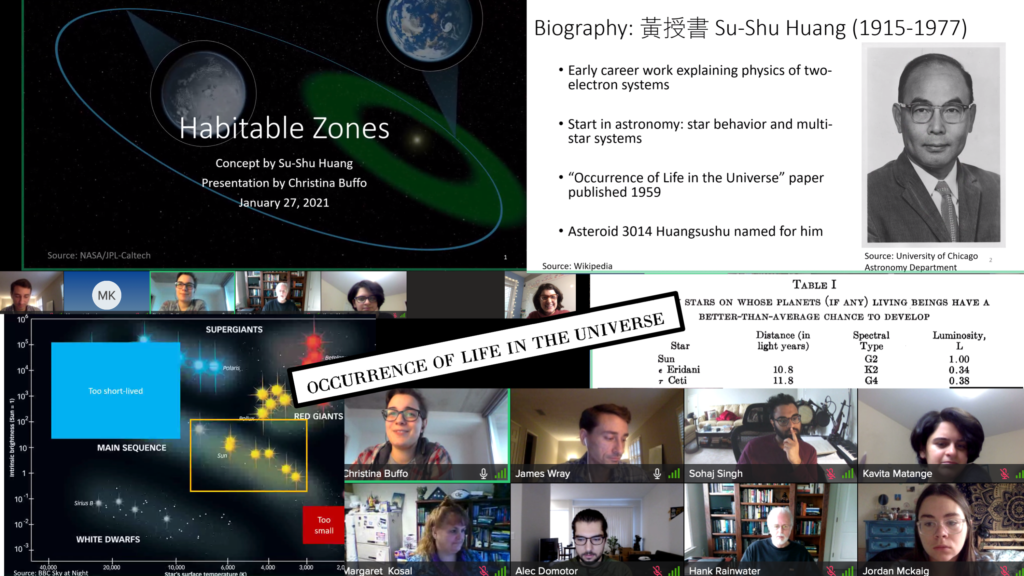
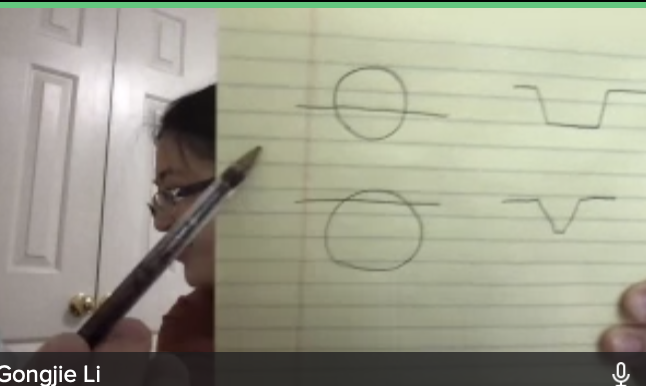
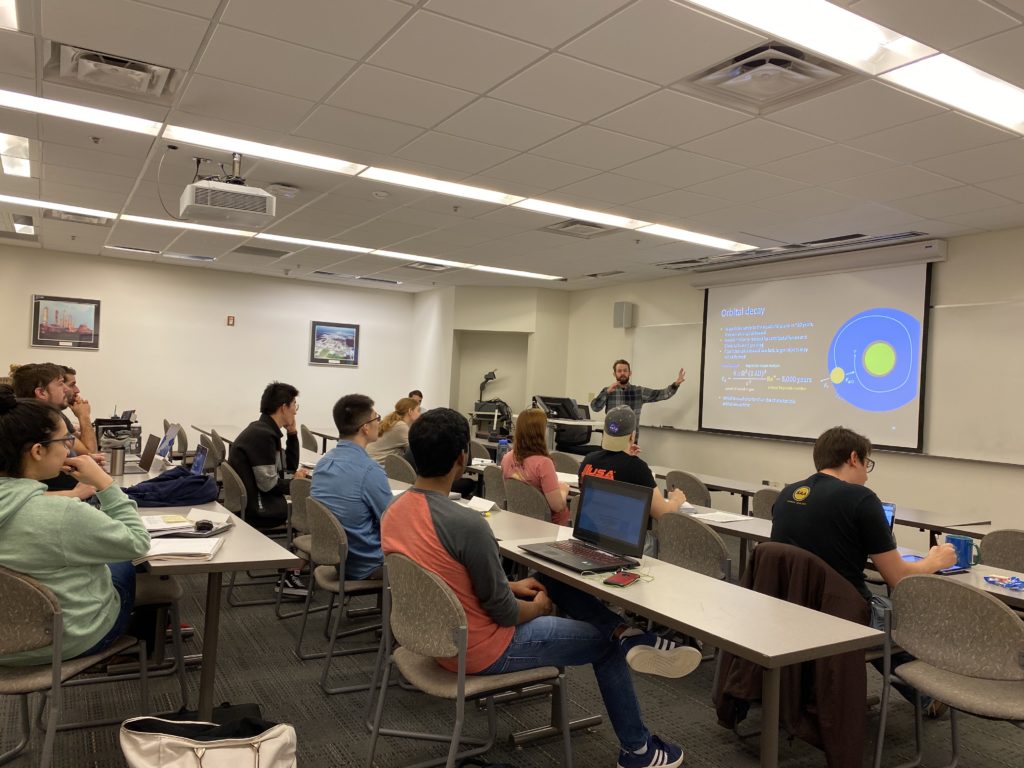
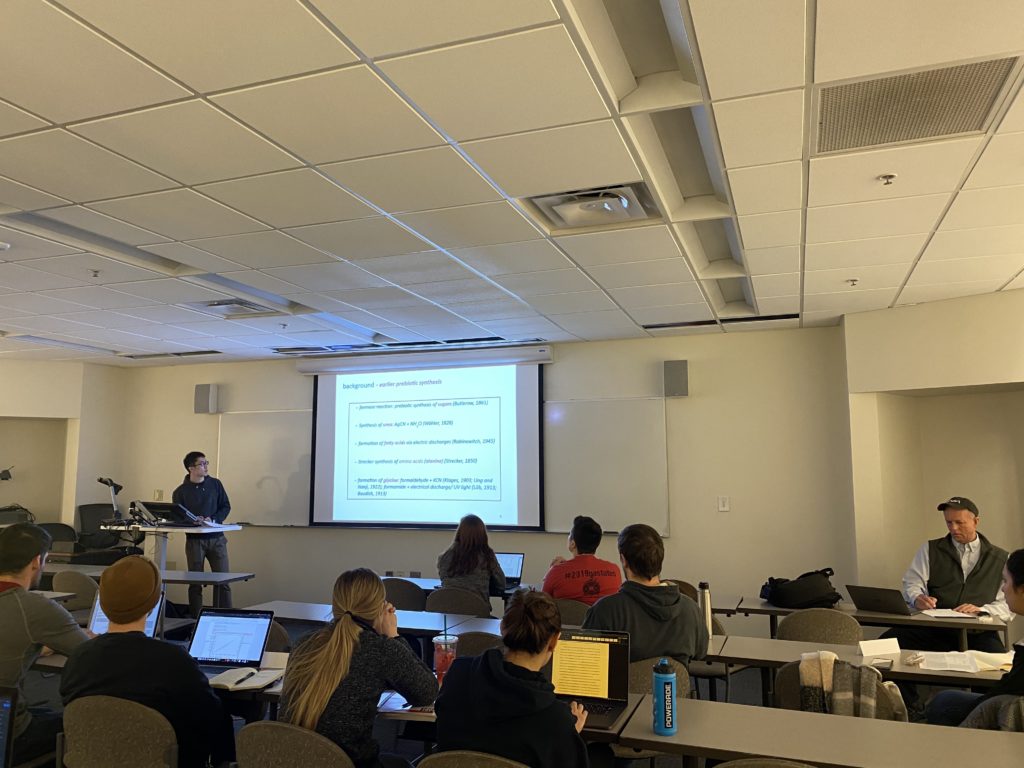
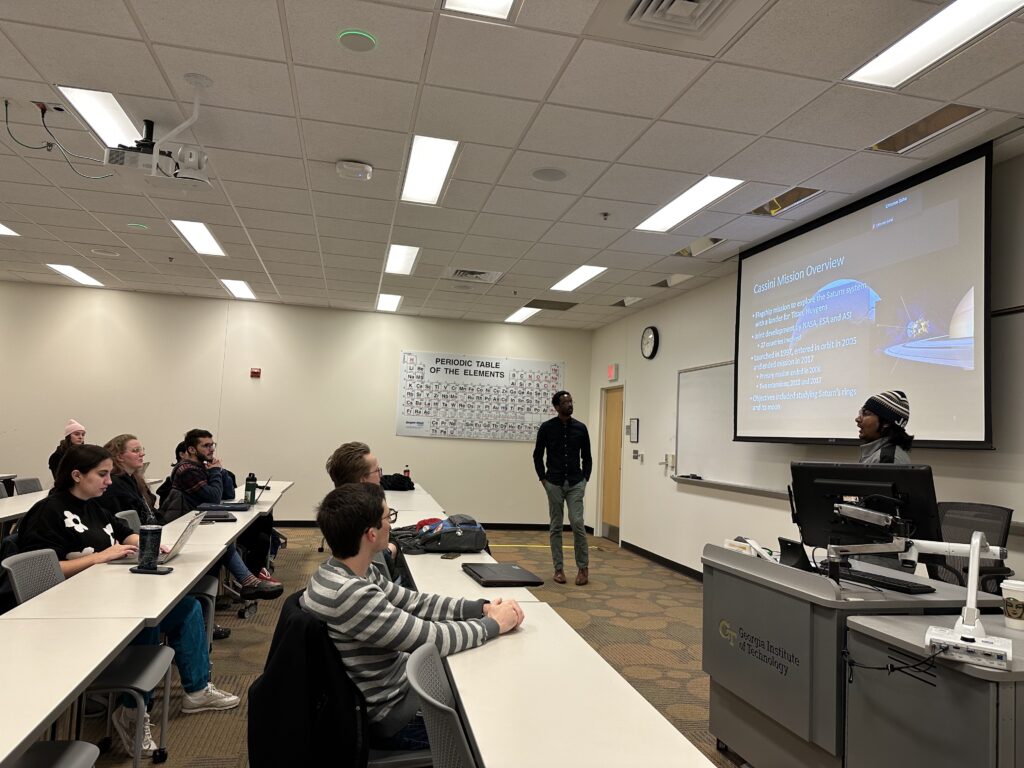
FREQUENTLY ASKED QUESTIONS
Q: I am a BS/MS student. I am taking the 4000/6000 cross-listed courses on the course list above for 4000-level credit. May I count my 4000-level credit for the 4000/6000 cross-listed course towards the certificate?
A: Yes, as long as the 4000-level version of the course had the same curriculum as the 6000-level of the course. (As is generally the case.)
Q: I’m a BS student at Georgia Tech. May I earn this certificate?
A: We have something even better for you! Check out the Astrobiology minor for undergraduates.
Q: If I am not enrolled as a graduate (PhD, MS, or BS/MS) student at Georgia Tech, may I obtain a Graduate Certificate of Astrobiology through your program?
A: Unfortunately, no. Our certificate program is limited to students currently enrolled in any graduate (PhD, MS, or BS/MS) degree program at Georgia Tech, including anyone in the 62 Or Older Graduate Program (degree-seeking and special non-degree seeking programs).
Q: Is it possible to complete the Graduate Certificate of Astrobiology 100% virtually?
A: Unfortunately, no. There are limited options for online courses in our curriculum. Some of our courses offer a hybrid option, but most are in person. It is the decision of the individual instructors how to format their course, and most are primarily or fully in-person instruction.
Q: Do you offer a MS / Masters or PhD / doctoral program in Astrobiology?
A: No. Instead, we have the Graduate Certificate of Astrobiology program, which is open to all enrolled graduate students in any graduate program at Georgia Tech. This is an additional certificate that you can put on your CV and will show you have additional training in this field, to make our students stronger on the job market. Many of our students do research in astrobiology-related topics for their graduate work, but their degrees are in one of the graduate (PhD, MS, or BS/MS) degree programs at Georgia Tech (e.g. Earth and Atmospheric Sciences, Chemistry/Biochemistry, Biological Sciences, Physics, Aerospace Engineering, etc).
Q: Do I need to specify my interest in pursuing the Astrobiology Graduate Certificate Program on my graduate application to Georgia Tech?
A: No. You are welcome to mention the program in your personal statement as one of the reasons you’re interested in Georgia Tech, but doing so is not required to take the certificate program. There is no special form or application. All current enrolled graduate (PhD, MS, or BS/MS) students who complete the required courses with sufficient grades are qualified to receive the certificate (see details above). Once you have met the requirements, you simply complete this form and email it to Prof. Jennifer Glass jennifer.glass@eas.gatech.edu.
Q: What undergraduate major(s) should be earned to be eligible for your Astrobiology Graduate Certificate? Does it need to be a three year or a four year degree university program?
A: Our graduate students typically have bachelors degrees from 4-year universities in one of the sciences or engineering, and some of them come from humanities backgrounds. Any Georgia Tech graduate (PhD, MS, or BS/MS) student is eligible to join our Astrobiology Graduate Certificate program. Some of our students have previously earned a Master’s degree, but that is not required, and Georgia Tech Master’s degree students are welcome to participate in this program.
Q: What are the admissions requirements to Georgia Tech graduate programs?
A: Graduate admissions requirements and the application process are explained in detail on the Georgia Tech Graduate Studies Website. The Astrobiology Graduate Certificate Program is not involved in admissions to any Georgia Tech graduate programs. Requirements for each graduate programs are listed on the degree program’s website. Please email graduate program coordinators for more information on admissions requirements to MS and PhD programs at Georgia Tech; the Astrobiology Graduate Certificate coordinator will not be able to provide any details on admissions requirements.
Q: Are my bachelors degree credits transferable to cover the cognate course requirements for this program?
A: Generally, no. Graduate programs will usually expect that you retake some courses at the graduate level with faculty in your graduate program to gain more specific expertise. By taking the cognate courses with our Georgia Tech faculty, you will learn more about astrobiology, which is one of the major goals of our program, and you will get to know our faculty, which is useful for assembling your graduate committee and for letters of recommendation. If you are credit-limited and have already completed a previous graduate program at another university, and if GT accepts your transfer credits to count towards your graduate credits, and if your graduate advisor approves, it may be possible to count your cognate course credits for this certificate. Please email Prof. Jennifer Glass (jennifer.glass@eas.gatech.edu) if you have this situation.
Q: Have students in my graduate program at Georgia Tech graduated from this certificate program?
A: Our graduate student certificate candidates come from MS, PhD, and BS/MS programs (thesis and non-thesis) in Earth and Atmospheric Sciences, Chemistry & Biochemistry, Biological Sciences, Bioengineering, Computer Science, Material Science & Engineering, Aerospace Engineering, and the 62+ Graduate Program. Learn more about our amazing alumni.
Q: What careers do astrobiologists pursue?
A: Read more about career paths in astrobiology on this website. If you are interested in astrobiology, you might also consider joining Saganet.
Q: Are there any astrobiology student groups at Georgia Tech?
A: Yes! ExplOrigins is our Georgia Tech early career astrobiology group for students and postdocs. Check out their page here with all the details on how to get involved.
If you have further inquires about the certificate program that are not covered in the FAQs above, please contact Prof. Jennifer Glass at jennifer.glass@eas.gatech.edu.
